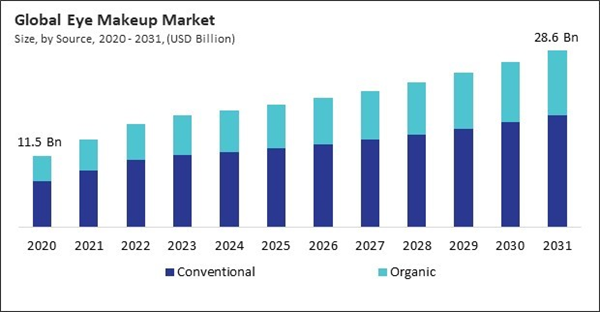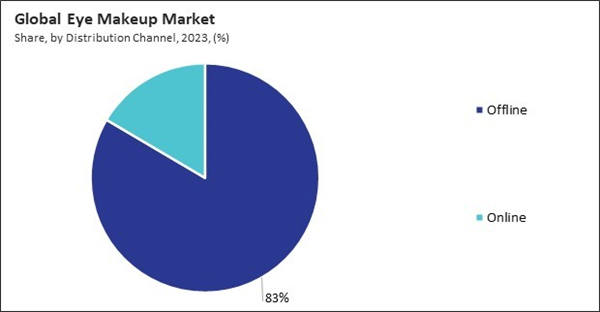The Europe segment acquired 35% revenue share in the market in 2023. The segment's expansion is driven by the region’s strong beauty culture, high consumer spending on cosmetics, and the presence of numerous leading beauty brands. The demand for high-quality, innovative products and growing sustainability and organic beauty trends further boost the European market.
Social media platforms such as Instagram, YouTube, and TikTok have revolutionized the beauty industry, significantly influencing consumer behavior and preferences, particularly in this market. Globally, the number of social media consumers has reached a new high of 5 billion. The anticipated increase in this figure is that it will reach approximately 5.80 billion users by 2027. Millennials and Gen Z comprise a substantial portion of the user base of these platforms, which are more inclined to follow and trust influencers. Hence, the visual appeal of them in online content drives consumers to experiment with different looks, propelling sales.
Additionally, As consumers become more selective and discerning in their beauty purchases, offering high-quality, functional products that stand out visually is crucial for capturing market share. One of the key areas of innovation is the development of long-lasting, smudge-proof, and waterproof products. These innovations appeal to consumers with active lifestyles or those living in humid climates, where traditional products may not hold up as effectively. Thus, this market is witnessing significant growth driven by technological advancements in product formulations.
However, Consumers are increasingly cautious about the ingredients in their beauty products, especially with growing awareness about harmful chemicals. These products often contain parabens, phthalates, and synthetic fragrances associated with various health risks. For instance, parabens have been associated with hormonal imbalances, while phthalates are recognized for their potential to disrupt the endocrine system. Hence, health and skin sensitivity issues have become a prominent challenge for this market.
Driving and Restraining Factors
Drivers- Rising Popularity Of Social Media And Beauty Influencers
- Innovation In Eye Makeup Formulas And Packaging
- Expansion Of E-Commerce Platforms
- Health Concerns And Skin Sensitivity Issues
- Shift Toward Minimalistic Beauty Trends
- Emerging Personalization And Customization Trends
- Growing Demand For Vegan And Cruelty-Free Products
- High Competition From Cosmetic Procedures
- Rise In DIY Beauty And Influencer-Led Preferences
Source Outlook
On the basis of source, the market is bifurcated into organic and conventional. The organic segment witnessed 35% revenue share in the market in 2023. Organic eye makeup, often formulated with natural ingredients, appeals to eco-conscious consumers who value sustainability and product transparency. The growing awareness around health and environmental impacts, coupled with rising demand for hypoallergenic and non-toxic formulations, contributes to the segment's notable growth.Distribution Channel Outlook
By distribution channel, the market is divided into online and offline. The online segment procured 17% revenue share in the market in 2023. The rise of virtual try-on tools, influencer-driven marketing, and social media integration has made online shopping more attractive to consumers, especially younger demographics. Moreover, the pandemic-driven shift toward online retail persists, with consumers continuing to appreciate the ease of comparing products, accessing customer reviews, and benefiting from home delivery.Product Outlook
Based on product, the market is classified into mascara, eye shadow, eye liner, eye pencil, eye brow enhancers, and others. The eye shadow segment procured 26% revenue share in the market in 2023. The increasing consumer demand for neutral, striking eye looks that can be used on a variety of occasions is the reason for the growth of this segment. The trend of experimenting with eye makeup, fueled by social media tutorials and influencer recommendations, encourages using multi-color palettes and long-wear formulas.Regional Outlook
Region-wise, the market is analyzed across North America, Europe, Asia Pacific, and LAMEA. The North America segment recorded 27% revenue share in the market in 2023. The region's demand is still being driven by the trend of bold eye makeup styles, beauty influencers, and social media. Moreover, the popularity of luxury and mass-market cosmetics, alongside the growing clean beauty trend, enhances the eye makeup market in North America.List of Key Companies Profiled
- L'Oréal S.A.
- Pacifica Beauty LLC
- Unilever PLC
- Kao Corporation
- NAOS
- The Estee Lauder Companies, Inc.
- Johnson & Johnson
- Pierre Fabre S.A
- Amway Corporation
- Coty, Inc.
Market Report Segmentation
By Source- Conventional
- Organic
- Offline
- Online
- Mascara
- Eye Shadow
- Eye Liner
- Eye Pencil
- Eye Brow Enhancers
- Other Products
- North America
- US
- Canada
- Mexico
- Rest of North America
- Europe
- Germany
- UK
- France
- Russia
- Spain
- Italy
- Rest of Europe
- Asia Pacific
- China
- Japan
- India
- South Korea
- Australia
- Malaysia
- Rest of Asia Pacific
- LAMEA
- Brazil
- Argentina
- UAE
- Saudi Arabia
- South Africa
- Nigeria
- Rest of LAMEA
Table of Contents
Companies Mentioned
Some of the key companies profiled in this Eye Makeup Market include:- L'Oréal S.A.
- Pacifica Beauty LLC
- Unilever PLC
- Kao Corporation
- NAOS
- The Estee Lauder Companies, Inc.
- Johnson & Johnson
- Pierre Fabre S.A
- Amway Corporation
- Coty, Inc.










